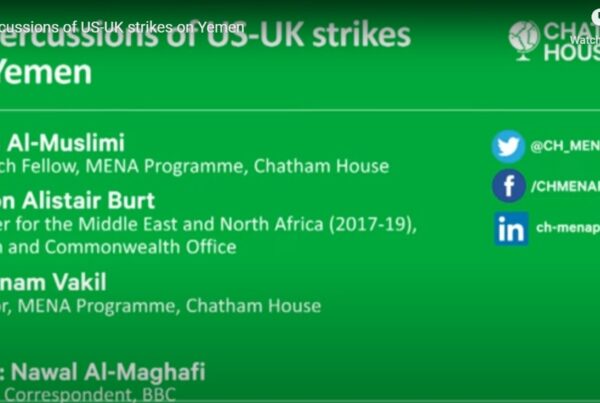A dark night without electricity turned bright as mid-day Monday as jets bombed what apparently was a storage area for Scud missiles in the Faj Attan district of Yemen’s capital.
Balls of fire shot into the air and thunderous blasts shook the city as aircraft, presumed to be from Saudi Arabia, hit the missile depot.
The explosions added to what already was the most intense night of aerial combat over the city since Saudi Arabia began its Decisive Storm bombing campaign last Thursday. As jets streaked overhead and explosions echoed across the landscape, anti-aircraft artillery rattled through the night.
For the first time, the bombing continued into the daylight hours, leaving residents little respite from the blasts.
“It has been pure horror,” said Ahmed al Hobishsi, who owns a grocery store. The air campaign has snuffed out what little business he had, he said.
Elsewhere in the country, the conflict between Houthi rebels and what remains of the internationally recognized government also intensified. The Houthis launched a massive attack in an effort to seize Aden, the seaport that had become the refuge of Yemen’s president, Abed Rabbo Mansour Hadi, before he fled the country, and were countered by a naval bombardment from Egyptian ships offshore.
Houthi rebels and Hadi loyalists were reported battling at the Aden airport. Conditions were reported grim in many locations. In al Hawta, the capital of Lahj province, a resident reached by phone said that bodies have been left in the streets for days.
Meanwhile, in northern Yemen, aid organizations reported that at least 45 civilians, most of them women and children, had been killed when an aircraft dropped its explosives on a camp for displaced people.
According to local humanitarian organizations, the strike happened in the early afternoon on a camp providing shelter and relief for those internally displaced by 2009 fighting in the bordering province of Sadah.
Most of the residents had lived at the camp since 2009, when they fled fighting in neighboring Sadah province.
Residents in Hajjah province, which abuts Saudi Arabia, said there were rumors of heavy military equipment being moved on the other side of the border, perhaps in preparation for a ground invasion of Yemen.
The reports of Egyptian ships firing along the southern coast were the first involvement of naval vessels in the conflict since Saudi Arabia launched its campaign against Iranian-backed Houthi rebels March 25.
An Egyptian ship targeted a group of Houthis and forces loyal to former President Ali Abdullah Saleh in the port of Shaqrah, in the southern province of Abyan. Additional air strikes targeted the Aden airport.
Around 10 p.m., an air strike targeted a mosque and a bus full of passengers in the area of Khour Maksar, in the middle of Aden. According to witnesses, seven civilians were killed and eight others wounded.
Conditions were deteriorating throughout the country. All Yemeni airports are closed, stranding thousands who’d hoped to leave the country as well as those booked to fly home.
Saudi Arabia and its allies have blocked all the country’s seaports, though a group of Yemeni refugees managed to make it to Somaliland on the African coast, according to the United Nations High Commissioner for Refugees.
Basic services are becoming increasingly difficult to obtain. Electricity is available for five hours or fewer per day in the capital, and fresh vegetables and fruits are in short supply.
An accurate count of casualties is not available. An independent Sanaa-based human rights group, Mwatana, said 27 civilians, including 15 children, had died in a single strike on the Sanaa airport.
Conditions are no better in the south, where residents of Aden report shops, banks, schools and even ATMs no longer function. Most of the pharmacies in the city have run out of eye drops, they say, after residents sought relief from smoke that filled the city after Saudi aircraft bombed an ammunition warehouse on Hadeed Mountain.
In al Hawta, in Lahj province, residents said that the city has been without water and electricity for five days. Doctors in the town’s Ibn Khldoun public hospital said only a handful of the facility’s 300 employees had made it to work.
Another unknown is whether the air strikes have weakened the Houthi rebels, who’ve controlled Sanaa since January and appeared Monday to still be pushing to capture Aden and other towns in the south.
Hopes for peace negotiations have faded, as battles seemed to have been joined throughout the country.
The prospect of an invasion by Saudi troops has prompted predictions that even those opposed to the Houthi rebels would feel obligated to resist the Saudis.
“We will all be Houthis if troops come to our country” said Ali al Munah, a shop owner in Sanaa. “This is our home and no one is allowed to break into it.”







